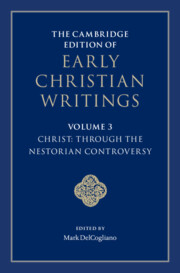Book contents
- The Cambridge Edition of Early Christian Writings
- The Cambridge Edition of Early Christian Writings
- The Cambridge Edition of Early Christian Writings
- Copyright page
- Contents
- Notes on Contributors
- Acknowledgments
- Note on the Texts and Translations
- Abbreviations
- Series Introduction
- Introduction
- Part I The Beginnings of Christology
- Part II Developing Christological Traditions
- 13 Tertullian, Apology 21
- 14 Tertullian, On the Flesh of Christ 1–16 and 24–25
- 15 Tertullian, Against Praxeas 1–4 and 27–30
- 16 Origen, On First Principles 2.6
- 17 Paul of Samosata, Selected Fragments
- 18 Aphrahat, Demonstration 17: On the Son
- 19 Hilary of Poitiers, On the Trinity 9.1–14
- 20 Ephrem the Syrian, Hymns on Faith 4, 10, 24, 31, 36, 51, 54, 77, 78, and 79
- Part III Traditions of Pro-Nicene Christology
- Part IV Controversy over Nestorius
- Suggestions for Further Reading
- Scriptural Index
20 - Ephrem the Syrian, Hymns on Faith 4, 10, 24, 31, 36, 51, 54, 77, 78, and 79
from Part II - Developing Christological Traditions
Published online by Cambridge University Press: 05 February 2022
- The Cambridge Edition of Early Christian Writings
- The Cambridge Edition of Early Christian Writings
- The Cambridge Edition of Early Christian Writings
- Copyright page
- Contents
- Notes on Contributors
- Acknowledgments
- Note on the Texts and Translations
- Abbreviations
- Series Introduction
- Introduction
- Part I The Beginnings of Christology
- Part II Developing Christological Traditions
- 13 Tertullian, Apology 21
- 14 Tertullian, On the Flesh of Christ 1–16 and 24–25
- 15 Tertullian, Against Praxeas 1–4 and 27–30
- 16 Origen, On First Principles 2.6
- 17 Paul of Samosata, Selected Fragments
- 18 Aphrahat, Demonstration 17: On the Son
- 19 Hilary of Poitiers, On the Trinity 9.1–14
- 20 Ephrem the Syrian, Hymns on Faith 4, 10, 24, 31, 36, 51, 54, 77, 78, and 79
- Part III Traditions of Pro-Nicene Christology
- Part IV Controversy over Nestorius
- Suggestions for Further Reading
- Scriptural Index
Summary
Ephrem the Syrian is one of the two most important fourth-century Syriac writers.1 He was born ca. 307–309 in the Roman city of Nisibis (modern-day Nusaybin in Turkey) and was likely raised as a Christian, having close relationships with the city’s bishops from his youth. He was a member of the îḥîdāyê (“single ones”), a group within the larger Christian community whose members devoted themselves to asceticism and celibacy without forming a distinct monastic community. This was a pattern of Christian living that was peculiar to Syriac-speaking regions. Ephrem also served his community as a teacher and perhaps also as a deacon. Above all, Ephrem was a writer: he wrote in multiple genres, including biblical commentaries and metrical homilies (memre), but he is especially known for his hymns (madrāse), about 400 of which are extant. In 363 Ephrem relocated to Edessa (modern-day Urfa in Turkey) when Nisibis, on the border between the Roman and Persian Empires, was ceded by the Romans to the Persians, prompting Christians to emigrate.
- Type
- Chapter
- Information
- The Cambridge Edition of Early Christian Writings , pp. 235 - 270Publisher: Cambridge University PressPrint publication year: 2022

